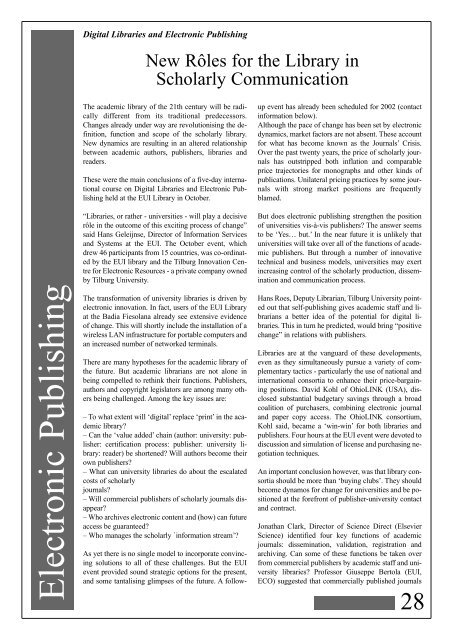History - European University Institute
History - European University Institute
History - European University Institute
Create successful ePaper yourself
Turn your PDF publications into a flip-book with our unique Google optimized e-Paper software.
Electronic Publishing<br />
Digital Libraries and Electronic Publishing<br />
New Rôles for the Library in<br />
Scholarly Communication<br />
The academic library of the 21th century will be radically<br />
different from its traditional predecessors.<br />
Changes already under way are revolutionising the definition,<br />
function and scope of the scholarly library.<br />
New dynamics are resulting in an altered relationship<br />
between academic authors, publishers, libraries and<br />
readers.<br />
These were the main conclusions of a five-day international<br />
course on Digital Libraries and Electronic Publishing<br />
held at the EUI Library in October.<br />
“Libraries, or rather - universities - will play a decisive<br />
rôle in the outcome of this exciting process of change”<br />
said Hans Geleijnse, Director of Information Services<br />
and Systems at the EUI. The October event, which<br />
drew 46 participants from 15 countries, was co-ordinated<br />
by the EUI library and the Tilburg Innovation Centre<br />
for Electronic Resources - a private company owned<br />
by Tilburg <strong>University</strong>.<br />
The transformation of university libraries is driven by<br />
electronic innovation. In fact, users of the EUI Library<br />
at the Badia Fiesolana already see extensive evidence<br />
of change. This will shortly include the installation of a<br />
wireless LAN infrastructure for portable computers and<br />
an increased number of networked terminals.<br />
There are many hypotheses for the academic library of<br />
the future. But academic librarians are not alone in<br />
being compelled to rethink their functions. Publishers,<br />
authors and copyright legislators are among many others<br />
being challenged. Among the key issues are:<br />
– To what extent will ‘digital’ replace ‘print’ in the academic<br />
library?<br />
– Can the ‘value added’ chain (author: university: publisher:<br />
certification process: publisher: university library:<br />
reader) be shortened? Will authors become their<br />
own publishers?<br />
– What can university libraries do about the escalated<br />
costs of scholarly<br />
journals?<br />
– Will commercial publishers of scholarly journals disappear?<br />
– Who archives electronic content and (how) can future<br />
access be guaranteed?<br />
– Who manages the scholarly `information stream’?<br />
As yet there is no single model to incorporate convincing<br />
solutions to all of these challenges. But the EUI<br />
event provided sound strategic options for the present,<br />
and some tantalising glimpses of the future. A follow-<br />
up event has already been scheduled for 2002 (contact<br />
information below).<br />
Although the pace of change has been set by electronic<br />
dynamics, market factors are not absent. These account<br />
for what has become known as the Journals’ Crisis.<br />
Over the past twenty years, the price of scholarly journals<br />
has outstripped both inflation and comparable<br />
price trajectories for monographs and other kinds of<br />
publications. Unilateral pricing practices by some journals<br />
with strong market positions are frequently<br />
blamed.<br />
But does electronic publishing strengthen the position<br />
of universities vis-à-vis publishers? The answer seems<br />
to be ‘Yes… but.’ In the near future it is unlikely that<br />
universities will take over all of the functions of academic<br />
publishers. But through a number of innovative<br />
technical and business models, universities may exert<br />
increasing control of the scholarly production, dissemination<br />
and communication process.<br />
Hans Roes, Deputy Librarian, Tilburg <strong>University</strong> pointed<br />
out that self-publishing gives academic staff and librarians<br />
a better idea of the potential for digital libraries.<br />
This in turn he predicted, would bring “positive<br />
change” in relations with publishers.<br />
Libraries are at the vanguard of these developments,<br />
even as they simultaneously pursue a variety of complementary<br />
tactics - particularly the use of national and<br />
international consortia to enhance their price-bargaining<br />
positions. David Kohl of OhioLINK (USA), disclosed<br />
substantial budgetary savings through a broad<br />
coalition of purchasers, combining electronic journal<br />
and paper copy access. The OhioLINK consortium,<br />
Kohl said, became a ‘win-win’ for both libraries and<br />
publishers. Four hours at the EUI event were devoted to<br />
discussion and simulation of license and purchasing negotiation<br />
techniques.<br />
An important conclusion however, was that library consortia<br />
should be more than ‘buying clubs’. They should<br />
become dynamos for change for universities and be positioned<br />
at the forefront of publisher-university contact<br />
and contract.<br />
Jonathan Clark, Director of Science Direct (Elsevier<br />
Science) identified four key functions of academic<br />
journals: dissemination, validation, registration and<br />
archiving. Can some of these functions be taken over<br />
from commercial publishers by academic staff and university<br />
libraries? Professor Giuseppe Bertola (EUI,<br />
ECO) suggested that commercially published journals<br />
28

















